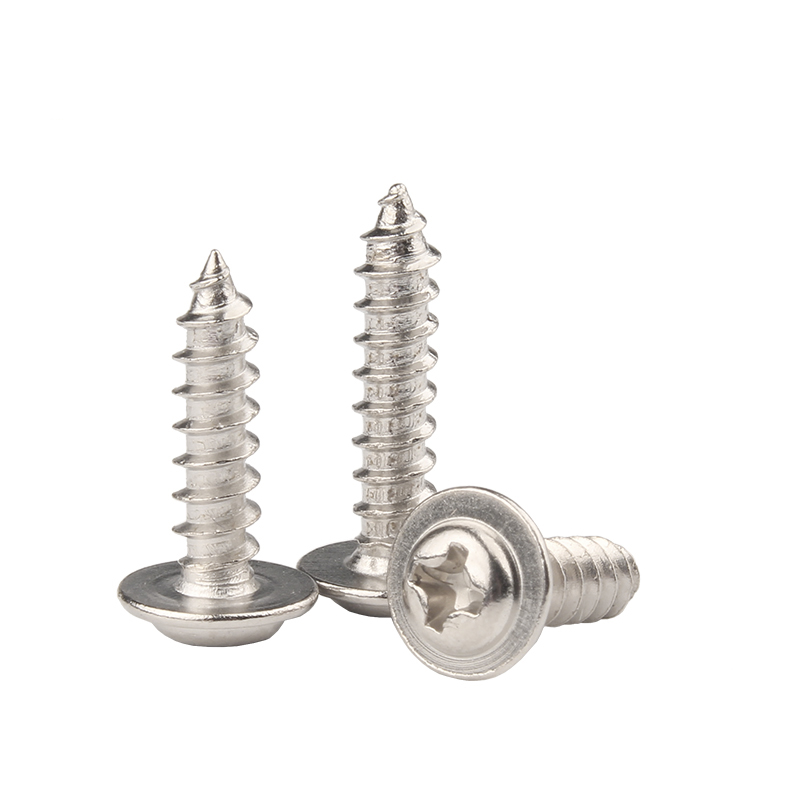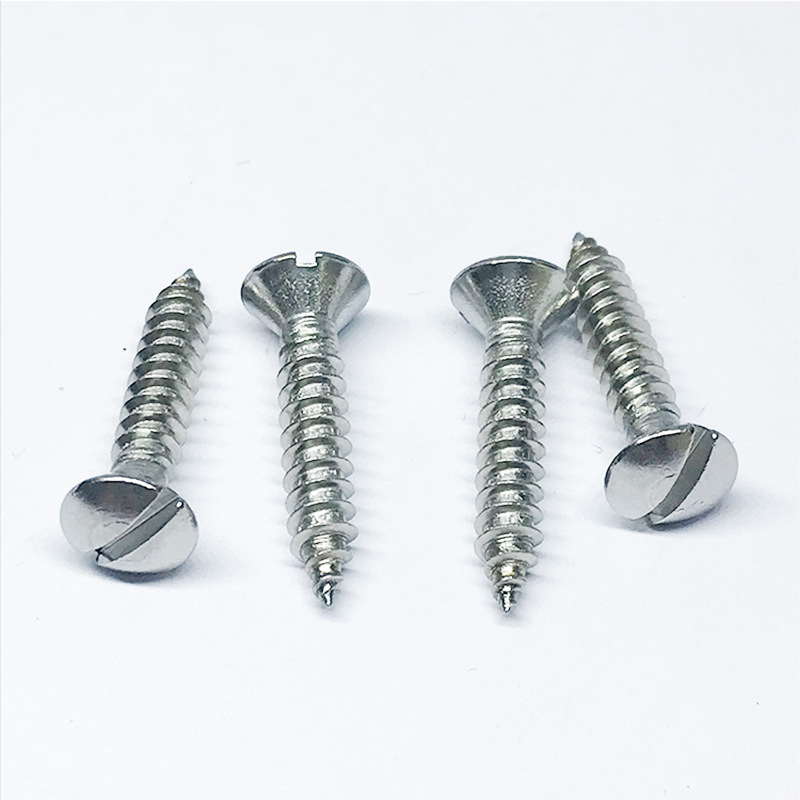Stainless steel self-tapping screws
1. What Are Self-Tapping Screws?
A self-tapping screw is designed to form its own threads as you drive it into a material such as wood, plastic or metal. In the past, you had to drill a guide hole before driving in whatever kind of screw would be used. Self-tapping screws create their own hole as pressure is exerted on them. They also provide a close, tight grip and a degree of certainty that the hole and screw fit exactly.


Self-tapping screws sound simple, but the science behind them is complex, and the choices within the realm of self-tapping screws are astounding. Within the self-tapping screw family are members that cut threads and others that form threads.
A self-tapping thread-forming screw would typically be used in plastic, and it deforms the material as it enters and drives inward.
A self-tapping thread-cutting screw would typically be used in wood or metal, and it cuts material out of its way as it enters and drives inward.
Self-tapping screws are normally made either from carbon steel or stainless steel, but they have other qualities that change their appearance and chemical composition. Stainless is the most commonly found screw material, often chosen for its corrosion resistance and is made with varying strengths that depend on the amount of nickel, chromium and other alloys they contain.
Stainless steel self-tapping screws are an essential component in the construction and manufacturing industries. These screws have a unique ability to create threads in materials like plastic, wood, and metal, without the need for a pre-drilled hole. In this article, we will take a closer look at the features and benefits of stainless steel self-tapping screws.
Firstly, stainless steel self-tapping screws are made from high-quality stainless steel, which makes them resistant to corrosion and rust. This property makes them ideal for use in outdoor applications, as they can withstand exposure to the elements without deteriorating over time.
In addition to their corrosion resistance, stainless steel self-tapping screws are also extremely durable. They can withstand high levels of stress and tension, making them perfect for use in load-bearing applications. This durability also ensures that the screws will not break or become damaged during installation, which can save time and money in the long run.
Stainless steel self-tapping screws are also incredibly versatile. They can be used in a wide range of materials, including wood, plastic, and metal. This versatility makes them an essential component in many different industries, including construction, automotive, and manufacturing.
Finally, the self-tapping feature of these screws makes them easy to install. The sharp point of the screw creates its own thread, which means that there is no need for a pre-drilled hole. This makes installation quick and efficient, reducing the time and labor required for a project.
What Are Some Characteristics and Applications of Self-Tapping Screws?
The science behind the turn of self-tapping screws is extensive and involves multiple factors:
• Coating (If Any): Screws may be coated with polish, with nickel, copper, zinc or tin plating, with phosphate, oxide lacquer and possibly other materials depending on the purpose they’re serving and the finish and performance that’s expected.
• Color: Surface treatments on self-tapping screws cater to an array of uses since they come in a rainbow of colors such as yellow, blue, green, gray, black, silver, copper and extra-bright hues.
• Composition: Some engineering calculations are necessary to determine the correct alloy mix that achieves the desired hardness of many kinds of self-tapping screws.
• Diameter: When it comes down to holding something in place, the girth of a screw plays a key role. The self-tapping screw diameter should be matched to the job, whether light or heavy.
• Hardness/Strength: Similar to the composition of self-tapping screws is the heat treatment that tempers the screws to the desired hardness. The amount, duration and temperature of the heat all make a difference in the end product.
• Head Style: The head refers to the shape of the screw’s top, which may be round, oval, square, flat, socket, fillister or hexagonal.
• Length: People are probably most familiar with this characteristic of a self-tapping or another kind of screw. The length of the screw makes all the difference in whether it can reach and dig into its target without going too deep.
• Recess: The recess is the part of the screw that receives the screwdriver or drill. It can have a variety of shapes such as square, slot, Phillips and hex.
• Thread: Self-tapping screws do their work by way of the size, density and pattern of the thread on them. All of the thread’s elements, from how closely together the thread sits to how many rows of it there are and where they begin and end, play a huge role in the science of the turn.
• Tip: The point of a screw holds a lot of potential to penetrate the material, tap a proper hole and hold fast. Screw tips may range from having a fine, sharp shape to a blunt edge.
Self-tapping screws may have a range of these characteristics, most likely to match one of the many applications for which self-tapping screws are used. They use these characteristics to complete the essential work of holding other larger pieces in place. The following are just a few of the possible applications for self-tapping screws.
• Gutters: Self-tapping screws are usually the foundation of any gutter-attachment system. They make for less work, a secure hold and a finish that will withstand a beating from the water and rooftop debris. The right screws will hold the gutters in place, withstand weather, resist corrosion, look neat and not drive too deeply, among other things.
• Medical: We don’t think of our bodies as a place where screws would go, but that’s exactly what happens in any number of replacements and other kinds of repair surgery. Medical articles routinely mention self-tapping screws and expound on their functionality for fastening parts inside the body. For example, dental implants that attach by screwing into the jaw bone are big, self-tapping screws with a tooth or teeth on top.
• Roofs: Self-tapping screws make the shingle and framing work go smoothly and can be ordered for whatever type of roofing materials you might use. Asphalt, wood and metal each have properties to which the screw can be matched for maximum grab, hold and endurance.
• Drywall: Hanging drywall is another place where self-tapping screws excel because of their threads. The pattern is designed to dig itself in tightly and hold fast, and the length penetrates whatever thickness of drywall is chosen. The right screws can make the difference between walls that hang straight, look good and last, and ones that don’t.
• Sheet Metal: The driving action and special drill-like tip of self-tapping screws are needed to work with various metals of different thicknesses. The screws might be used for anything from a barn roof and automobile to building construction and artwork.
• Plastic: The technology associated with self-tapping screws for plastic has evolved to the point that the pieces are now specialized and sometimes made of plastic themselves. Self-tapping screw technology has evolved to include more lightweight materials such as plastic and aluminum and shorter thread engagements.
If you are looking for high-quality stainless steel self-tapping screws, then look no further than our company. Our stainless steel self-tapping screws are made from the finest materials and are designed to provide reliable and long-lasting performance.
1. Durable and Corrosion-Resistant: Our stainless steel self-tapping screws are made from high-quality stainless steel that is resistant to rust and corrosion. This means that they are suitable for use in a wide range of applications, including outdoor environments and areas where moisture is present.
2.Wide Range of Sizes and Types: We offer a wide range of stainless steel self-tapping screws in different sizes and types to suit your specific needs. Whether you need screws for thin or thick materials, we have the right solution for you.
3.Easy to Install: Our stainless steel self-tapping screws are designed for easy installation, saving you time and effort. They are self-drilling, which means that you do not need to pre-drill a hole before installing the screw.
4.Cost-Effective: Our stainless steel self-tapping screws offer excellent value for money. They are competitively priced and offer a long service life, which means that you will not need to replace them frequently.
5.Wide Range of Applications: Our stainless steel self-tapping screws are suitable for use in a wide range of applications, including construction, furniture, automotive, and many others.
In conclusion, if you need high-quality stainless steel self-tapping screws, then our company is the perfect choice. We offer a wide range of screws in different sizes and types, all made from the finest materials and designed to provide reliable and long-lasting performance. Contact us today to learn more about our products and services.




